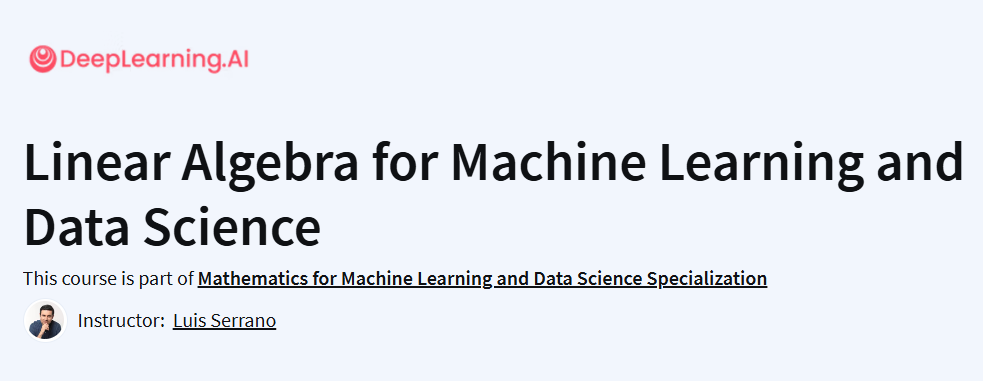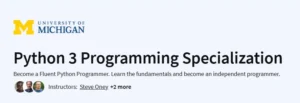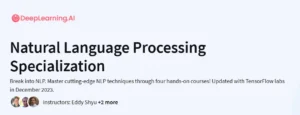What you will learn in Linear Algebra for Machine Learning and Data Science Course
- Understand how to represent data as vectors and matrices, and identify their properties using concepts like singularity, rank, and linear independence.
- Apply common vector and matrix algebra operations such as dot product, inverse, and determinants.
Express certain types of matrix operations as linear transformations, and apply concepts of eigenvalues and eigenvectors to machine learning problems.
Program Overview
Systems of Linear Equations
⏱️ 8 hours
- Learn how matrices arise from systems of equations and how certain matrix properties can be understood in terms of operations on systems of equations.
- Explore concepts like singularity, linear dependence and independence, and determinants.
Vector and Matrix Operations
⏱️ 8 hours
- Dive into vector operations, including sum, difference, multiplication, and dot product.
- Understand different types of matrices and their operations.
Linear Transformations
⏱️9 hours
- Study linear transformations and how they can be represented using matrices.
- Apply these concepts to machine learning problems.
Eigenvalues and Eigenvectors
⏱️9 hours
- Learn about eigenvalues and eigenvectors and their significance in machine learning.
- Apply these concepts to problems like Principal Component Analysis (PCA).
Get certificate
Job Outlook
- A solid understanding of linear algebra is crucial for careers in machine learning and data science.
- Proficiency in these concepts enhances one’s ability to develop and optimize machine learning models.
- Employers value candidates who can bridge the gap between theoretical concepts and practical implementation in data-driven roles.
Specification: Linear Algebra for Machine Learning and Data Science
|
FAQs
- The course is beginner-friendly and can be taken either standalone or as the first part of the Mathematics for Machine Learning and Data Science Specialization.
- DeepLearning.AI estimates around 34 hours for completion.
- As a self-paced course, learners typically take 3–4 weeks at ~10 h/week, though faster or slower pacing is completely supported.
- The course welcomes absolute beginners, requiring no advanced math. It emphasizes building intuition through real-world applications rather than grind-heavy math exercises.
- However, to complete programming tasks, basic familiarity with Python and Jupyter/NumPy is helpful—particularly since visual and code-based exercises are part of the curriculum.
The course covers:
- Vectors and matrices, including operations like dot product, inverses, determinants.
- Linear transformations, singularity, rank, and independence.
- Eigenvalues and eigenvectors, with practical implications and PCA for dimensionality reduction.
You’ll apply these concepts with Python-based assignments, building intuition through visualization rather than dense mathematics.
Strengths:
- Uses intuitive visual pedagogy, ideal for learning how linear algebra underpins ML.
- Rated 4.6/5 across thousands of learners—reflecting consistent satisfaction.
- Serves as a strong foundation for further courses in calculus and statistics within the specialization.
Limitations:
- Ideal for aspiring data scientists, ML engineers, or analysts who need a solid grasp of linear algebra concepts to better understand algorithms like PCA or transformation-based models.
- Completing the course strengthens your foundation and sets you up for advanced topics in the full specialization.
- Many learners recommend pairing the certificate with personal project work—like implementing PCA or vector-based visualization—for impactful portfolio demonstrations.





